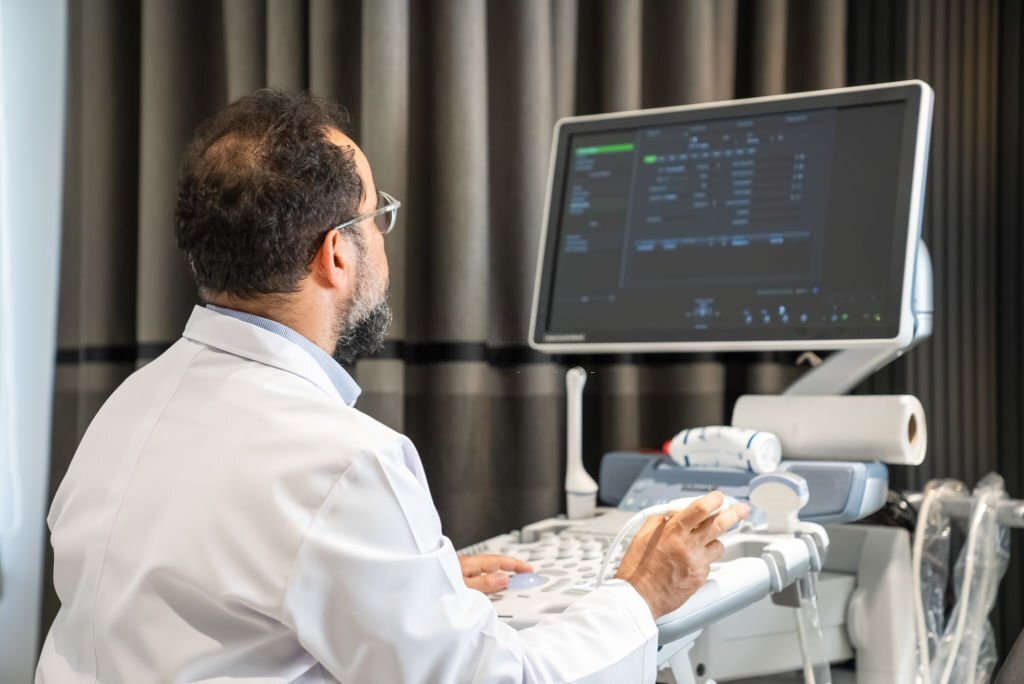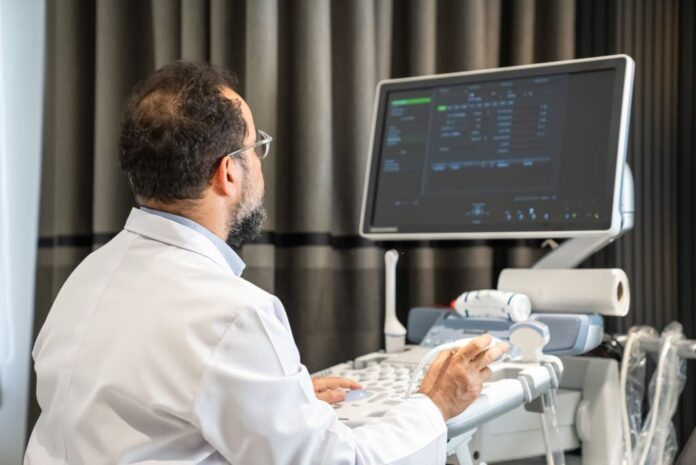Introduction
Ultrasound technicians, also known as diagnostic medical sonographers, play a crucial role in the healthcare industry. They use ultrasound technology to produce images of the body’s internal organs and tissues, helping doctors diagnose and treat various medical conditions. Ultrasound technology has become an essential tool in healthcare due to its non-invasive nature and ability to provide real-time images.

This article will explore the education and training required to become an ultrasound technician, how to choose the right ultrasound program, gaining hands-on experience, mastering the art of ultrasound imaging, building a strong foundation in anatomy and physiology, staying current in the field, navigating the job market, thriving in the workplace, and advancing your career.
Education and Training
To become an ultrasound technician, individuals must complete the necessary education and training. The most common pathway is to earn an associate’s degree in diagnostic medical sonography from an accredited program. These programs typically take two years to complete and include both classroom instruction and clinical rotations. Some individuals may choose to pursue a bachelor’s degree in diagnostic medical sonography or a related field for more advanced career opportunities.
In addition to degree programs, there are also certificate programs available for those who already have a degree in a related field or for individuals who want to specialize in a specific area of ultrasound technology. These certificate programs are shorter in duration and focus on specific skills or specialties within the field.
Licensing and certification requirements vary by state, but most states require ultrasound technicians to be licensed or certified. The American Registry for Diagnostic Medical Sonography (ARDMS) offers certification exams that are widely recognized and accepted by employers. To be eligible for these exams, individuals must meet certain education and clinical experience requirements.
Choosing the Right Ultrasound Program
When selecting an ultrasound program, there are several factors to consider. First and foremost, it is important to ensure that the program is accredited by a recognized accrediting body. Accreditation ensures that the program meets certain standards of quality and that graduates will be eligible for certification exams.
The curriculum of the program is also an important consideration. Look for programs that offer a comprehensive curriculum that covers all aspects of ultrasound technology, including anatomy and physiology, ultrasound physics, and specialized imaging techniques. It is also beneficial to choose a program that offers hands-on clinical opportunities, as this will provide valuable real-world experience.
Researching and comparing different ultrasound programs is essential to making the right decision. Look for programs that have a good reputation and positive reviews from current and former students. It can also be helpful to reach out to professionals in the field for their recommendations and insights.
Gaining Hands-On Experience
Gaining hands-on experience is a crucial part of ultrasound training. Clinical rotations and internships provide students with the opportunity to apply their knowledge and skills in a real healthcare setting under the supervision of experienced professionals.
To find and secure clinical opportunities, students should reach out to their program’s clinical coordinator or career services department. They can provide guidance on finding available positions and help with the application process. It is important to start the search early, as clinical opportunities can be competitive.
During clinical rotations, it is important to make the most of the experience by actively participating and seeking out learning opportunities. Take advantage of the chance to observe and assist experienced ultrasound technicians, ask questions, and practice your skills under their guidance. This hands-on experience will help develop your skills and confidence in performing ultrasounds.
Mastering the Art of Ultrasound Imaging
Mastering the art of ultrasound imaging requires strong technical skills and a keen eye for detail. It is important to practice regularly and seek feedback from experienced professionals to improve your technique.
One tip for developing strong technical skills is to focus on proper probe manipulation. The angle, pressure, and movement of the probe can greatly affect the quality of the image produced. Practice different techniques and experiment with different angles and pressures to find what works best for you.
Repetition is also key to improving ultrasound imaging techniques. The more ultrasounds you perform, the more comfortable and proficient you will become. Take advantage of any opportunities to practice, whether it be during clinical rotations, internships, or in a simulated lab setting.
There are also resources and tools available to help improve ultrasound imaging skills. Online tutorials, textbooks, and workshops can provide additional guidance and practice opportunities. It can also be helpful to join professional organizations or online forums where you can connect with other ultrasound technicians and learn from their experiences.
Building a Strong Foundation
Having a strong foundation in anatomy and physiology is essential for ultrasound technicians. Understanding the structure and function of the body’s organs and tissues is crucial for accurately interpreting ultrasound images.
To build a strong foundation, it is important to study and review anatomy and physiology concepts regularly. There are many resources available, such as textbooks, online courses, and interactive anatomy apps, that can help reinforce your knowledge.
It can also be beneficial to seek out additional learning opportunities, such as attending workshops or conferences focused on anatomy and physiology. These events often provide in-depth discussions and hands-on activities that can enhance your understanding of the subject matter.
Staying Current in the Field
Staying current in the field of ultrasound technology is essential for providing the best possible care to patients. The field is constantly evolving, with new advancements and techniques being developed regularly.
Continuing education and professional development are important for staying updated on advancements in ultrasound technology. Many professional organizations offer continuing education courses and conferences that provide opportunities to learn about the latest research and techniques in the field.
Subscribing to industry publications and journals can also help stay informed about new developments. These publications often feature articles written by experts in the field and provide valuable insights into current trends and practices.
Networking with other ultrasound technicians and professionals in the field is another way to stay current. Joining professional organizations and attending conferences or workshops can provide opportunities to connect with others in the field and learn from their experiences.
Navigating the Job Market
Once you have completed your education and training, it is time to navigate the job market and find your first ultrasound technician position. There are several strategies that can help you in your job search.
Start by researching job opportunities in your desired location. Look for job postings on online job boards, hospital websites, and professional organization websites. Networking can also be a valuable tool in finding job opportunities. Reach out to professionals in the field, attend career fairs, and join online forums or social media groups for ultrasound technicians.
When preparing your resume and cover letter, highlight your education, clinical experience, and any specialized skills or certifications you have obtained. Tailor your resume to each specific job application to showcase how your skills and experience align with the requirements of the position.
Thriving in the Workplace
To thrive in the workplace as an ultrasound technician, there are several essential skills and traits that are important to develop. Strong communication skills are crucial for effectively interacting with patients and healthcare professionals. Attention to detail is also important for accurately performing ultrasounds and interpreting images.
Problem-solving abilities are another important skill for ultrasound technicians. In some cases, ultrasounds may present challenges or unexpected findings that require critical thinking and problem-solving skills to address.
Building positive relationships with patients and colleagues is also important for success in the workplace. Treat patients with empathy and respect, and work collaboratively with other healthcare professionals to provide the best possible care.
Advancing Your Career
There are many opportunities for growth and specialization in the field of ultrasound technology. Advanced certifications and specializations can open up new career opportunities and increase earning potential.
The ARDMS offers several advanced certifications in specialized areas of ultrasound technology, such as obstetrics and gynecology, vascular sonography, and cardiac sonography. These certifications require additional education and clinical experience beyond the basic certification.
Setting and achieving career goals is important for advancing your career in ultrasound technology. Take the time to assess your skills, interests, and long-term goals, and create a plan for achieving them. This may involve pursuing additional education or certifications, seeking out new job opportunities, or taking on leadership roles within your current organization.
Conclusion
Becoming an ultrasound technician requires a combination of education, training, and hands-on experience. It is important to choose the right ultrasound program that provides a comprehensive curriculum and clinical opportunities. Developing strong technical skills in ultrasound imaging and building a strong foundation in anatomy and physiology are essential for success in the field. Staying current in the field through continuing education and professional development is important for providing the best possible care to patients. Navigating the job market and thriving in the workplace require strong communication skills, attention to detail, problem-solving abilities, and the ability to build positive relationships with patients and colleagues. Advancing your career in ultrasound technology involves setting and achieving career goals and pursuing advanced certifications or specializations. With dedication and hard work, aspiring ultrasound technicians can pursue their goals in the field and make a meaningful impact on patient care.


